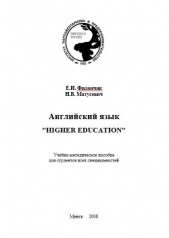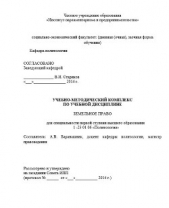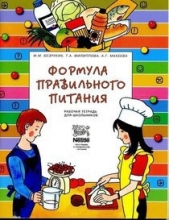Английский язык. Higher education

Английский язык. Higher education читать книгу онлайн
Настоящее учебно-методическое пособие предназначено для студентов социально-экономического факультета ИПП как дневной, так и заочной формы обучения, изучающих социокультурный и/или лингвострановедческий курс английского языка. Рассчитано на 72 часа аудиторной работы для студентов гуманитарных и экономических специальностей на дневной форме обучения, 30 часов и 10 часов соответственно для студентов гуманитарных и экономических специальностей на заочной форме обучения, что отображено в разделе 1 пособия.
Характер данного пособия определяется целью, которая ставится при обучении иностранным языкам в неязыковых вузах - углубление иноязычных знаний и формирование коммуникативных навыков и умений студента. Данное пособие призвано обеспечить студентов тематически упорядоченным языковым материалом, который может служить основой для развития и закрепления навыков, необходимых для глубокого понимания содержания иноязычного текста, анализа прочитанного, подготовки к монологической и диалогической речи, а также для письменных сообщений.
Внимание! Книга может содержать контент только для совершеннолетних. Для несовершеннолетних чтение данного контента СТРОГО ЗАПРЕЩЕНО! Если в книге присутствует наличие пропаганды ЛГБТ и другого, запрещенного контента - просьба написать на почту [email protected] для удаления материала
bachelor's degree
степень бакалавра
obtain master's degree
получать степень магистра
non-state-owned schools
негосударственные школы
PART 1
DIRECTIONS:
Read the text:
Education in Belarus
Scientific and intellectual potential is the main strategic resource of Belarus. In 1950s Belarus became the country of universal literacy. In 1989, according to the results of the census, 899 people per each thousand engaged in the national economy had higher and secondary education; 144 people among them were the graduates from the higher educational establishments. Thus, we can say that Belarus had a developed system of education. It embraced 11,000 educational establishments; 430,000 teachers worked there; 33 per cent of population attended different forms of classes.
Nowadays the number of students attending different educational establishments has not changed. The republic guarantees its citizens the right to universal secondary education and creates means for further professional education. It tries to preserve the democratic character of education, paying much attention to common human values, developing independent critical thinking instead of simple perception of information.
The republic is reforming its system of education today with the aim of creating an independent, qualitatively new national school, corresponding to international standards and ensuring each citizen the right to the high-quality education according to his abilities and inclinations.
The reform envisages a continuity of study at all stages, such as pre-school, secondary school, vocational training and specialized secondary school, and at the higher school level. It gives teachers and students freedom in the choice of educational forms and methods, while the results must correspond to the state educational standards.
The main principles of the educational system in Belarus are the priority of human values, national culture as the basis of education, humanism, sense of ecological purpose, scientific basis, democracy, support of gifted children and so on.
In the period from 1996 till 2010 the reform envisages:
1. 12 year secondary school. Academic education in the 11—12th forms according to the main trends of the higher education: humane, natural, aesthetic and technological.
2. Primary vocational training at vocational schools.
3. Secondary vocational training at secondary specialized schools and colleges.
4. Higher education at two levels: the first level for those seeking a bachelor's degree (4—5 years) and the second level to obtain a master's degree (5—6 years).
5. Possibility for masters to obtain doctoral degree.
There have been changes in the organization of education itself. New types of educational
establishments have appeared: gymnasiya, lyceum, experimental school, college. There appeared non-state-owned schools of various kinds, private kindergartens, schools at home, commercial institutes. So, it stimulates effectiveness of education, creates non-idealistic attitude to society on students' part.
PART II
DIRECTIONS:
Find the English equivalents of the following sentences in the text:
Следует отметить, что в пятидесятых годах Беларусь стала страной всеобщей грамотности.
Республика гарантирует своим гражданам право на среднее общее образование и дает возможности для дальнейшего профессионального образования.
Государство предоставляет учителям и учащимся свободу в выборе форм и методов обучения, но результаты должны соответствовать государственным стандартам.
Появились новые типы образовательных учреждений: гимназия, лицей, экспериментальная школа, колледж.
PART III
DIRECTIONS:
Fill in the blank with the correct word:
1. In 1989, according to the results of the ..., 899 people per each thousand ... in the national economy had ... and ... education; 144 people among them were ... from the..........
2. The republic tries to ... the democratic character of education, paying much attention to.........
190 developing independent critical thinking instead of simple ... of information.
3. The republic is ... its system of education today with the aim of creating an independent,... new national school,... to international standards and ... each citizen the right to the high-quality education according to his ... and ....
4. So, it stimulates ... of education, creates......to society on students' part.
PART IV
DIRECTIONS:
Complete the sentence with the best answer (a, b or c) according to the information in the text:
1. Scientific and intellectual potential is
a) the national pride of Belarus.
b) the main historical value of Belarus.
c) the main strategic resource of Belarus.
2. Nowadays the number of students attending different educational establishments
a) has increased.
b) has not changed.
c) has lowered.
3. The republic gives teachers and students freedom
a) in the choice of educational forms and methods.
b) in the choice of textbooks.
c) in attending schools.
4. The reform envisages
a) 11 year secondary education.
b) compulsory 10 year education.
c) 12 year secondary education.
PART V
DIRECTIONS:
Answer the questions:
1. What is the main strategic resource of Belarus?
2. What is the system of education in Belarus like?
3. Has the number of students changed in Belarus nowadays?
4. What does the republic guarantee its citizens?
5. What is the aim of the educational reform in Belarus today?
6. What does the reform envisage?
7. What are the main principles of education in Belarus?
8. What new types of educational establishments have appeared in Belarus lately?
9. What does the reform stimulate?
PART VI
DIRECTIONS:
Read the text once again and divide it into several logical parts. Think of the title to each of the parts.
PART VII
DIRECTIONS:
Put the sentences into the correct order:
1. Belarus is the country of universal literacy.
2. New types of educational establishments.
3. The educational reform.
4. The guarantee of the right to education.
5. The main principles of the educational system in Belarus
ACTIVITY I
SUPPLEMENTARY READING:
DIRECTIONS:
Read the text and translate it with the help of a dictionary.
State policy in the sphere of education
Intellectual resources are the major wealth of the Republic of Belarus. Therefore, development of the national education system is the top priority of the public policy. According to the Constitution of the Republic of Belarus and the Act on Education every citizen of the country has a right to receive tuition-free education. Besides, attendance of general educational establishments (school, gymnasium) is compulsory and is under state control. Having acquired basic knowledge (the 1st-10th form), one has several options: to continue school education (11th -12th forms) and complete secondary education; or to enter a vocation school (special secondary educational establishments) and acquire a profession. Both options are free of charge.























